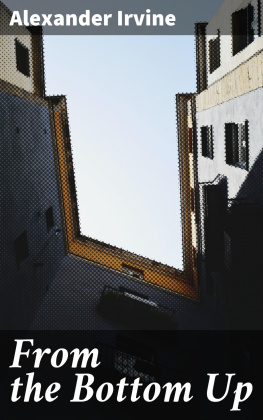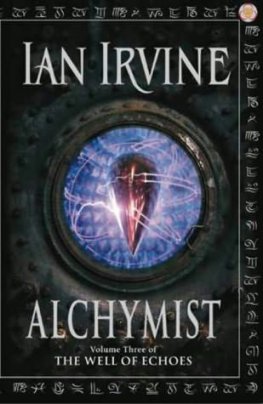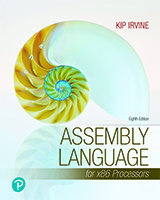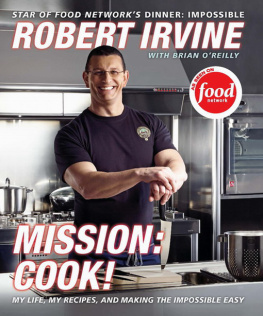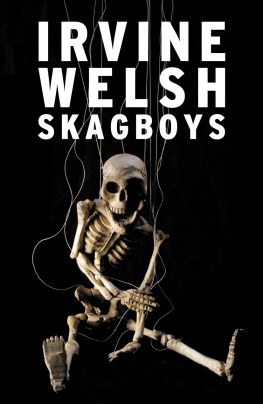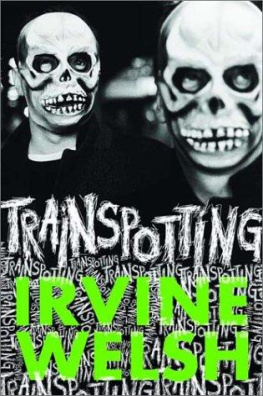Alexander Irvine - From the Bottom Up
Here you can read online Alexander Irvine - From the Bottom Up full text of the book (entire story) in english for free. Download pdf and epub, get meaning, cover and reviews about this ebook. year: 2019, publisher: Good Press, genre: Non-fiction. Description of the work, (preface) as well as reviews are available. Best literature library LitArk.com created for fans of good reading and offers a wide selection of genres:
Romance novel
Science fiction
Adventure
Detective
Science
History
Home and family
Prose
Art
Politics
Computer
Non-fiction
Religion
Business
Children
Humor
Choose a favorite category and find really read worthwhile books. Enjoy immersion in the world of imagination, feel the emotions of the characters or learn something new for yourself, make an fascinating discovery.
- Book:From the Bottom Up
- Author:
- Publisher:Good Press
- Genre:
- Year:2019
- Rating:3 / 5
- Favourites:Add to favourites
- Your mark:
- 60
- 1
- 2
- 3
- 4
- 5
From the Bottom Up: summary, description and annotation
We offer to read an annotation, description, summary or preface (depends on what the author of the book "From the Bottom Up" wrote himself). If you haven't found the necessary information about the book — write in the comments, we will try to find it.
From the Bottom Up — read online for free the complete book (whole text) full work
Below is the text of the book, divided by pages. System saving the place of the last page read, allows you to conveniently read the book "From the Bottom Up" online for free, without having to search again every time where you left off. Put a bookmark, and you can go to the page where you finished reading at any time.
Font size:
Interval:
Bookmark:
For a complete list, please see the .
DOUBLEDAY, PAGE & COMPANY
1910
INTO FOREIGN LANGUAGES, INCLUDING THE SCANDINAVIAN
COPYRIGHT, 1909, 1910 BY DOUBLEDAY, PAGE & COMPANY
PUBLISHED, FEBRUARY, 1910
MAUDE HAZEN IRVINE
| CHAPTER | PAGE |
| Boyhood in Ireland | 3 |
| The Beginning of an Education | 24 |
| On Board a Man o' War | 40 |
| Problems and Places | 53 |
| The Gordon Relief Expedition | 63 |
| Beginnings in the New World | 82 |
| Fishing for Men on the Bowery | 90 |
| A Bunk-house and Some Bunk-house Men | 105 |
| The Waif's Story | 119 |
| I Meet Some Outcasts | 126 |
| A Church in the Ghetto | 144 |
| Working Way Down | 156 |
| Life and Doubt on the Bottoms | 166 |
| My Fight in New Haven | 183 |
| A Visit Home | 193 |
| New Haven Againand a Fight | 207 |
| I Join a Labour Union and Have Something to Do with Strikes | 213 |
| I Become a Socialist | 235 |
| I Introduce Jack London to Yale | 250 |
| My Experiences as a Labourer in the Muscle Market of the South | 256 |
| At the Church of the Ascension | 274 |
| My Socialism, My Religion and My Home | 285 |
| Frontispiece |
| FACING PAGE |
| 4 |
| 8 |
| 38 |
| 50 |
| 54 |
| 110 |
| 146 |
| 238 |
| 248 |
| 252 |
| 258 |
| 258 |
| 270 |
| 276 |
| 294 |
| 298 |
There are four different houses in the picture. The third door from the left is that of the house in which he was born.
Font size:
Interval:
Bookmark:
Similar books «From the Bottom Up»
Look at similar books to From the Bottom Up. We have selected literature similar in name and meaning in the hope of providing readers with more options to find new, interesting, not yet read works.
Discussion, reviews of the book From the Bottom Up and just readers' own opinions. Leave your comments, write what you think about the work, its meaning or the main characters. Specify what exactly you liked and what you didn't like, and why you think so.

